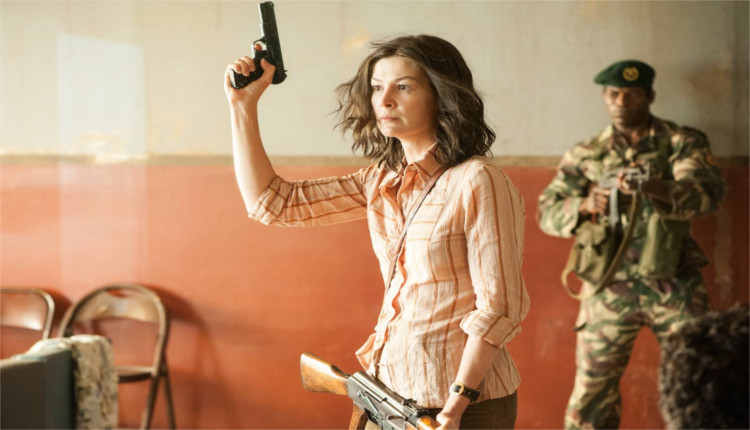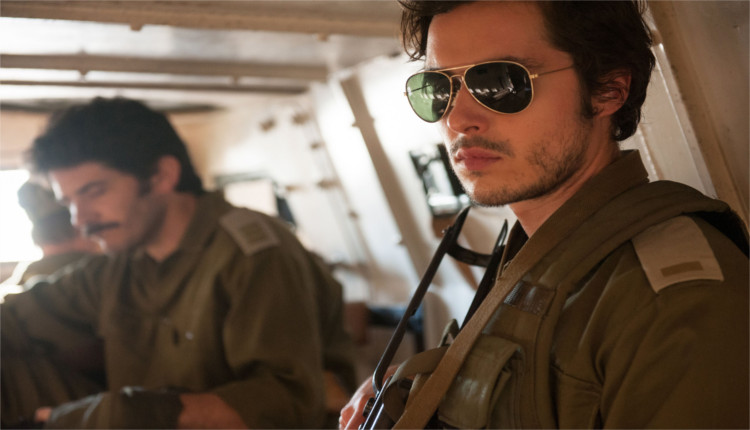Film Review | Entebbe Dances Around Being Memorable
Israeli people like to dance with chairs. I’m aware this is an odd way of opening a review about a film concerning an infamous counter-terrorism operation. Yet, the image of the professional, dancing Israelis were the abiding memory Entebbe left me with it. This is through no fault of my own. The film really wanted you to remember the contemporary, chair-utilising performance piece that actually book-ends the action. However, it doesn’t help matters that not much else is worth recalling in this middling, forgivably fine period thriller.
Entebbe tells the true story of the 1976 hijacking of an AirFrance plane by Palestinian and German terrorists and the hostage rescue mission that followed. The hijacked plane would land at an airport in Uganda, with the terrorists being granted asylum by noted despot and president for life Idi Amin. In return for the safe release of the 248 hostages, the two groups orchestrating the takeover—the Popular Front for the Liberation of Palestine and the German Revolutionary Cells—called on the Israeli government to release about 50 Palestinians who were imprisoned in Israel and various other locations around the world.
While this is more of an ensemble piece, the closest thing to lead characters the film has are the two far-left German hijackers, Wilfred and Brigette, played by Daniel Bruhl and Rosamund Pike respectively. The action hops around between the situation on the ground and the government officials in Israel trying to think of a viable solution. Pressure mounts on the Prime Minister and his cabinet as the crisis takes a turn when the hostage takers begin separating the Jewish passengers from the others a few days into the siege.
Israeli viewers probably won’t be best pleased with the both-sides mentality on display here. However, the bigger issue might be why the ‘white terrorists’ are portrayed more sympathetically than the brown ones. The plight of the Palestinian people gets a mention. Yet, its Wilfred and Brigette who are shown to be the conflicted ones even thought their ‘we didn’t sign up for this’ attitudes ring false when what they agreed to was potential mass murder. The British born Pike and the German/Spanish Bruhl do their best, but their chemistry is hampered by the fact that their characters sound like they live on different islands, let alone countries—Pike’s accent is untraceable while Bruhl ironically sounds like an Oxbridge grad after years in English language features.
Entebbe tries to say something about what drives terrorists to commit atrocities. Yet, it often ends up as ham-fisted and overly expository. “I want to throw bombs into the consciousness of the masses” says the relatively privileged Wilfred as reason for his involvement to a Palestinian freedom fighter who lost everything. If you don’t see the reply of “And what if you have to throw a real bomb?” coming from a mile away, than you haven’t been paying attention. It’s this kind of self-explanatory, pseudo-intellectual barb trading that makes up too much of the dialogue.

This is Entebbe’s most crippling flaw: It’s so eager to get everyone’s perspective that it ends up getting no ones in earnest. There’s an underdeveloped and hackneyed subplot involving a Mossad agent with a dancer girlfriend who fears for her partner’s welfare, some frivolous flashbacks involving the Germans that add up to nothing and plenty of scenes with the Israeli special forces that act only as painful reminders that we are not watching Zero Dark Thirty. It’s a far cry from atrocious and none of it is ever boring, but none of it is much thrilling either.
The representation of the Israeli government doesn’t fare much better either. The drama there comes from the tension between the pragmatic prime minister Yitzhak Rabin (Lior Ashkenazi) and the hawkish Shimon Peres (Eddie Marsan). To his credit, the ever reliable Marsan is a quite fun as the sly, scheming Peres with every line he goes for pouring out of his mouth with earned authority. But Rabin’s repeated proclamations about wishing we could all just get along are hoary to say this least. Plus. probably unbelievable given the situation. The implication that the Entebbe incident, via Rabin’s clunky foreshadowing, was the impetus for the Oslo Accords seems especially out of place.

The most egregious crime might be how director José Padhillia treats the climax. Throughout the runtime, that aforementioned modern take on a traditional Jewish dance is intercut into the narrative and of course it plays a part in the most important sequence: the raid on the airport to save the hostages. The scene is shot in slow-motion so superfluous it drains any sense of tension as we cut repeatedly to a bunch of Israelis dancing with chairs in a move that’s harder to explain than the Gaza conflict itself. It is literally Padhilia’s only surprising decision. It’s also his worst.
Entebbe is okay but also destined to be forgotten. Hell, no one seems to remember that they already made one of these (1977’s Raid On Entebbe). Watching it is like to sitting through a serviceable, streamlined history lesson. It’s a well-produced Wikipedia entry and that’s about all it is. Padhillia is only really known for directing episodes of Narcos and it’s fitting. Like a lukewarmly received Netflix show, Entebbe is the easy to follow, comfort watch you stream when you’re looking for something to soundtrack the housework. Dancing Israelis notwithstanding.
